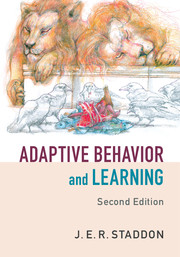Book contents
- Frontmatter
- Contents
- Preface to the second edition
- Acknowledgments
- 1 The evolution, development, and modification of behavior
- 2 Variation and selection: kineses
- 3 Reflexes
- 4 Direct orientation and feedback
- 5 Operant behavior
- 6 Reward and punishment
- 7 Feeding regulation: a model motivational system
- 8 The optimal allocation of behavior
- 9 Choice: dynamics and decision rules
- 10 Foraging and behavioral ecology
- 11 Stimulus control and cognition
- 12 Stimulus control and performance
- 13 Molar laws
- 14 Time and memory, I
- 15 Time and memory, II
- 16 Template learning
- 17 Learning, I
- 18 Models of classical conditioning
- 19 Learning, II
- 20 Learning, III: procedures
- 21 Comparative cognition
- Index
7 - Feeding regulation: a model motivational system
Published online by Cambridge University Press: 05 March 2016
- Frontmatter
- Contents
- Preface to the second edition
- Acknowledgments
- 1 The evolution, development, and modification of behavior
- 2 Variation and selection: kineses
- 3 Reflexes
- 4 Direct orientation and feedback
- 5 Operant behavior
- 6 Reward and punishment
- 7 Feeding regulation: a model motivational system
- 8 The optimal allocation of behavior
- 9 Choice: dynamics and decision rules
- 10 Foraging and behavioral ecology
- 11 Stimulus control and cognition
- 12 Stimulus control and performance
- 13 Molar laws
- 14 Time and memory, I
- 15 Time and memory, II
- 16 Template learning
- 17 Learning, I
- 18 Models of classical conditioning
- 19 Learning, II
- 20 Learning, III: procedures
- 21 Comparative cognition
- Index
Summary
The operant behavior of higher animals depends on their motivation, the value of the reward or punishment. If we ignore for the moment the problem of competition among motivational systems (hunger vs. sex vs. thirst, etc.), there are two aspects to motivation: “How hungry am I?” and “How hard should I work to get food?” The answer to the first question depends entirely on the animal's internal state; it is a regulatory question. But the answer to the “How hard should I work to get food?” question depends both on the animal's state and on the opportunities offered by the environment: It is worth working hard for food if much food is to be got. It is not worth working hard if the probability of payoff is low (on the other hand, if you are hungry and more work means more food, you may work hard even for small amounts). This aspect of motivation is known as incentive.
This chapter deals with regulation and incentive. I take feeding as a typical motivational system and show how taste, body weight, and even drugs and brain lesions combine to affect how much rats will eat and how hard they will work for food. The aim is to dissect a single motivational system and show how a few relatively simple principles underlie diverse effects. The next chapter deals with interactions among motivational systems.
Reinforcement and homeostasis
Animals must eat to live and, on an operant food schedule, must work to eat. It would be astonishing, therefore, if schedule performance had nothing to do with the regulation of nutritional balance. Nevertheless, the study of reinforcement schedules has been pursued largely in isolation from regulatory considerations. For example, open-economy experiments, where the animal is maintained at a reduced weight throughout brief daily experimental sessions, usually find a positive relation between the rate of an operant response and the rate or amount of food delivery. On the other hand, in closed economies, where the animal lives in the experimental apparatus and gets all its food from the reinforcement schedule, rate of operant responding is inversely related, or unrelated, to rate of food delivery. This difference should not surprise. In an open economy, the animal cannot regulate his food intake (the experimenter does it for him); in a closed economy, he must do it himself.
- Type
- Chapter
- Information
- Adaptive Behavior and Learning , pp. 175 - 204Publisher: Cambridge University PressPrint publication year: 2016



